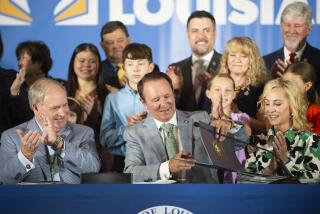Religion, Justice Slip Out of Balance : Law: Court’s conservative activism puts landlords’ beliefs ahead of renters’ rights.
Judicial activism, whether liberal or conservative, is troublesome not so much because it is arrogant but because it appears so rational to the activists. But one man’s reasoning may be another man’s Wonderland.
A tendency toward conservative activism has been brewing for nearly a decade in the California courts; in May, it boiled over in a landmark landlord-rights decision from the Court of Appeal, which the state Supreme Court has agreed to review.
The case is one of several being brought by strict Christian landlords across the country, challenging laws that protect against housing discrimination based on marital status. In holding for the landlord, the appellate court accepted religious conviction as a trump over valid laws.
If the decision is upheld, it could fundamentally alter the balance between law and religion, for it would serve as precedent for holding personal religious belief higher than obedience to the law. The court’s opinion also will be a test of whether politically conservative judges mean it when they say that their function is to give effect to the Legislature’s will.
The case involves the owner of rental property in Chico who says that because she believes that sex outside marriage is a sin, she should not have to rent to unmarried couples, thus, in the court’s words, “facilitating the sin of fornication.”
On the surface, this seems to make sense. Religious liberty is one of our most cherished rights. But the Court of Appeal failed to address a threshold question: Since when is renting apartments the exercise of religion? By failing to take up such an obvious and obviously important question, the court demonstrates that it is interested in result, not reasoning--the definition of judicial activism.
No court has ever explained what, if any, limits can be placed on the exercise of religion, but the U.S. and California Supreme Courts have always been clear that while religious belief is constitutionally protected, as are common religious practices such as going to church, religion-based conduct that moves into the secular world is not. By uncritically accepting the premise that apartment renting constitutes an exercise of religion, the court mocks the notion that there is a secular world anywhere and turns civil law into little more than an option for religious believers.
Supreme Court Justice Antonin Scalia has clearly noted the way such a rule could be abused: Letting the civil law give way too easily to the beliefs of religious adherents would effectively grant believers “a private right to ignore generally applicable laws,” one that has no discernible limiting principle. The problem is the subjective nature of belief. There are no objective criteria to determine what an individual believes, so as a practical matter, courts must accept virtually any assertion of belief without further inquiry.
Viewed superficially, the California appellate decision is a tit-for-tat response to liberal activism, allowing religious conservatives to thumb their nose at the law the way liberals supposedly have on such issues as the death penalty. But the great irony of the free-exercise exemption is that it opens the door for claims based on liberal as well as conservative religious beliefs.
Any observer of human behavior can see the attraction in a rule permitting people to exempt themselves from the law based on their subjective beliefs. People generally do not like having to obey the obligations that law imposes; that’s why we have laws in the first place. The public good is much easier to stomach if only other people have to give something up to make it happen. But there will be few “other people” if personal belief entitles anyone to claim an exemption from disagreeable laws.
When religiously motivated conduct moves outside the confines of religious ritual, ceremony or practice, and specifically when it moves into the commercial marketplace, the rules of secular order must be taken into account. As the U.S. Supreme Court has long explained, this does not minimize the importance of religious belief in our pluralistic society, it just strikes a necessary balance between religious belief and the obligations of citizenship. By allowing the term “free exercise of religion” to mean any action by a believer, no matter how far removed from religious practice, the Court of Appeal took a large step toward making the obligations of citizenship illusory and reduced the Legislature to little more than a debating society. That was the fear of those who decried liberal judicial activists. It has no less force now.
More to Read
Get the L.A. Times Politics newsletter
Deeply reported insights into legislation, politics and policy from Sacramento, Washington and beyond. In your inbox three times per week.
You may occasionally receive promotional content from the Los Angeles Times.










